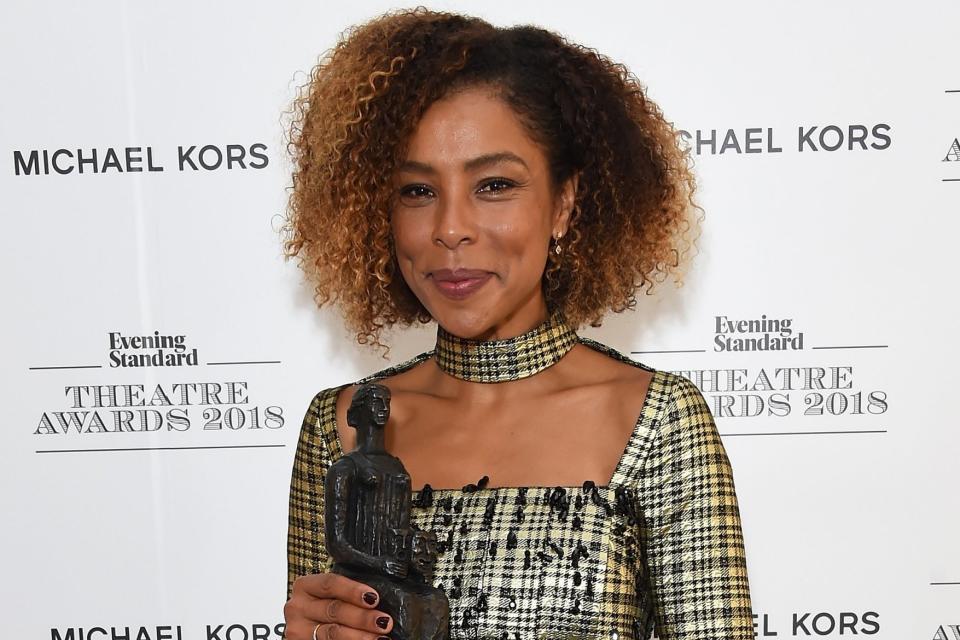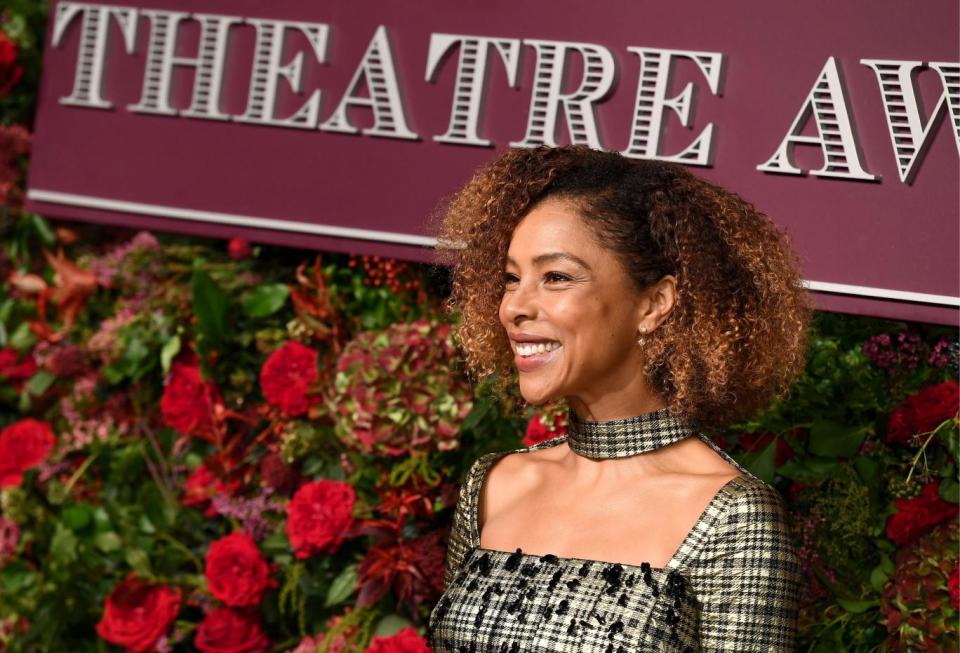Sophie Okonedo interview: 'Anyone can play anyone in Shakespeare. There are no limits'

Raucous applause and cheers shook the Theatre Royal Drury Lane on Sunday night when Sophie Okonedo and Ralph Fiennes won Best Actress and Best Actor at the Evening Standard Theatre Awards for their revelatory performances in Antony and Cleopatra.
“It’s completely thrilling because this is one of my favourite jobs ever,” says Okonedo, grinning, when we speak. “To get an award for something you are having a ball doing is a real buzz.”
The production comes back into the National’s repertory this week after a hiatus, during which “me and Ralph had been texting each other saying we feel quite lost not doing the play, because it has been so meaningful for us, such an event. We’ve become mates, which is not always necessary [with co-stars]. But Ralph is a very special person, a real artist.” The same could be said of Okonedo.
It’s only the second time in the awards’ 68-year history that male and female leads in the same show have taken the two top honours — it last happened with The National theatre’s 1988 production of Cat on a Hot Tin Roof starring Lindsay Duncan and Ian Charleson — which is testament to the lucidity of Simon Godwin’s production, and Okonedo’s and Fiennes’ chemistry.

The Times critic Sam Marlowe praised “fine performances, rich in detail, full of passion’s tremulous desire, yet movingly tempered with the rue of middle age”. The Evening Standard’s Henry Hitchings, said: “Okonedo revels in Cleopatra’s contradictory nature, capturing her wit and vanity, her disarming mix of regal pride and playful charm… her paradoxical quality dazzling all around her.”
While Fiennes has been a fixture of the London stage in recent years (he also won the Evening Standard’s Best Actor prize in 2016), winning The Natasha Richardson Award for Best Actress, in partnership with Christian Louboutin, was a welcome return for Okonedo, 50.
The daughter of a Jewish Pilates teacher and a Nigerian government worker who left when she was five and later died, she grew up on Wembley’s rough and since-demolished Chalkhill Estate, left school at 16 and began her career with the Royal Court’s young writers’ and actors’ groups.
She went to Rada on a scholarship and since graduating has mixed stage work with film (an Oscar-nominated performance in Hotel Rwanda in 2004, a Bafta-nominated lead role in Mrs Mandela in 2010) and TV (The Slap, Undercover, and a ground-breaking Queen Margaret in The Hollow Crown).
But she took a break from the stage after Haunted Child at the Royal Court in 2011, concentrating on screen work and at some point — she is deliberately vague — acquiring a husband, Jamie, and two stepchildren and moving to East Sussex. Okonedo also has an adult daughter, Aoife, from a previous relationship.
Then in 2014 she was cast opposite Denzel Washington in the Broadway revival of Lorraine Hansbury’s A Raisin in the Sun, about a black family trying to better themselves in 1950s Washington, and won a Tony Award. Okonedo calls the play “so beautiful, almost perfect” and says of her co-star “bloody hell, he is an amazing theatre actor”. They didn’t become mates, but he calls her when he’s in London.

This was followed almost immediately by Arthur Miller’s The Crucible with Ben Whishaw (who is one of her closest friends) and Saoirse Ronan, for director-of-the-moment the Belgian Ivo van Hove, also on Broadway. This became the hottest ticket in town and saw her nominated for a second Tony, but she found it “knackering”.
“There is no light in the play, no hope. So you feel a bit bashed round the head by the end of the night. I can do that for five weeks, but that play ran for six months, and I was really homesick too. It was at a time when I had played a lot of sad parts and I think I am moving on from that now. If I am doing eight shows a week, I want it to have some funny bits.”
Her choice of light relief, which brought her back to London, was last year’s West End revival of Edward Albee’s The Goat, or Who is Sylvia, playing the wife of a man (Damian Lewis) who leaves her for the titular animal.
“I thought, wow, let’s have a go,” she says. “It was the perfect antidote to the Crucible — lively, punchy and short.”
When Simon Godwin, whom she knew from Royal Court workshops, came calling about Cleopatra, she didn’t take long to say yes. Her first Shakespeare job was playing Cressida for Trevor Nunn at the National in 1991, and she recalls cycling from her flat in Muswell Hill over Waterloo Bridge, watching Denys Lasdun’s Brutalist building looming up before her and feeling: “This is it: I’ve arrived”.
She says: “I am rather partial to Shakespeare, though I haven’t done loads. But when it’s done right, there’s nothing like it. There are layers upon layers upon layers, and you unpack new things constantly. I don’t know how he knew so many things — about the world, about women, about human nature, life, death, our fears and hopes.” Plus, Cleopatra is actually very funny, with a thoroughly modern way of dissing her rivals and owning her boyfriend. Okonedo taps into this trait brilliantly, making the audience complicit, like a seasoned raconteur.
When I ask how it feels to play someone endlessly fascinating, she says she didn’t think about it. “I work on the words, deeply, for months and months, then somehow she is past me and I can’t think of anything else other than the way she feels. Although it is me as well, and I use myself in all of it.” (Her husband complains, he has been living with Cleopatra for six months.) She also didn’t ponder the significance of a black Cleopatra at the National Theatre.
“I think Shakespeare envisages her as black because she talks about it — ‘this tawny front’, all those references — although historically I think she would have been related to the Greeks,” Okonedo says. “But Shakespeare wasn’t writing historically, he was writing imaginatively. He writes about ghosts, for f***’s sake, people coming back from the dead, fairies. If you want history, make a documentary. Anyone can play anyone in Shakespeare. I don’t think there are limits.”
Okonedo got from her mother, Joan, “a sense that I could do anything. I didn’t ever feel there was anything in my way, any boundaries”, and indeed she seemed to breeze into the Royal Court and Rada, where her contemporaries included National Theatre boss Rufus Norris and actors Adrian Lester, Lolita Chakrabarti and Marianne Jean-Baptiste. Although she often turns down work that is “not up to scratch”, she has also made a constant living out of acting.
Her life has not been without challenges, however. It wasn’t easy growing up black and Jewish in Wembley in the Seventies and Eighties, or being a single mother in the 2000s. I first met Okonedo in 2004, when her heartbreaking performance in Hotel Rwanda earned her an Oscar nomination, which brought a flood of lucrative if stereotypical job offers, from which she recoiled.
“It was a bit overwhelming and I was much more timid then,” she recalls. “I was a single parent and my daughter was young, and it was much harder to drop things and just go [to LA]. In those days there was a lot less opportunity for a black actor than there is now. The parts would be much more interesting and diverse now.”
She thinks things have got more inclusive in the arts world in terms of ethnicity, and that the parts she is offered have become more interesting as she has grown older. Aoife, now in her 20s and a personal trainer in London, and her stepson Stan and stepdaughter Josie, 19 and 15, don’t think in terms of race or class.
However, Okonedo is wary of being a spokeswoman. Although she identifies as working class, she declines to comment on the much-debated “poshing-up” of the acting business. Or on the #MeToo movement, although Harvey Weinstein allegedly had her removed from a film because he didn’t consider her “f***able”. “I welcome all the conversations we are having,” is her disarming response to such issues.
She is, like her mother and her husband, a glass half-full person. Her career is going strong, with roles in the drama series Chimerica and the Hellboy movie reboot, and a TV comedy about the PR world, in the pipeline.
She has an Evening Standard award to go with her Tony. She is loving being 50. Jamie surprised her with a handbuilt cycle “in my Cleopatra colours, green and gold” and took her on a cycling tour of Suffolk. They have an idyllic-sounding, outdoorsy life in a house he designed and built near Glydebourne, in 10 acres of land on which a neighbour’s cows graze. But surely, I say, there must be something you miss about London. “This is gonna sound really cheesy,” she smiles. “but I miss going to the theatre. I love being a punter.”
Antony and Cleopatra is at the National Theatre and will be broadcast live to cinemas worldwide on 6 December, nationaltheatre.org.uk
For more from the awards, go to standard.co.uk/theatreawards #ESTheatreAwards

 Yahoo News
Yahoo News 